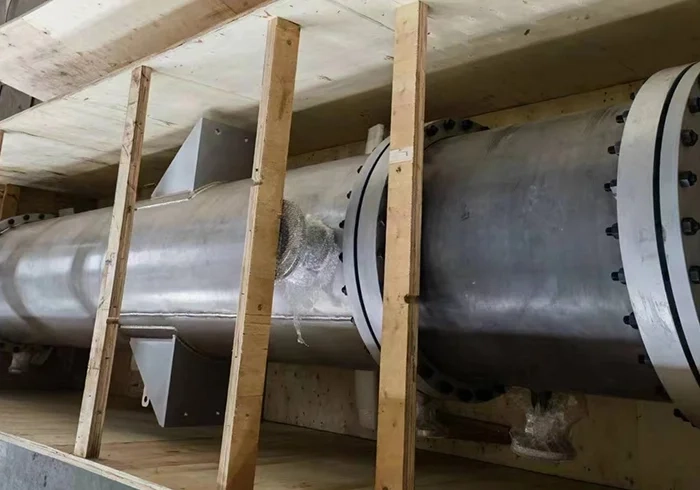- This topic is empty.
-
AuthorPosts
-
2025-04-11 at 2:23 pm #3446
In industries where temperatures soar to extremes, chemical reactions are aggressive, or corrosive fluids flow through systems, the need for reliable and high-performance heat exchangers is paramount. Among the materials used to construct these crucial components, zirconium has emerged as one of the most effective materials for heat exchangers in highly demanding environments. With its unique combination of high-temperature resistance, superior corrosion resistance, and remarkable mechanical properties, zirconium heat exchangers have become a critical component in sectors ranging from petrochemicals and nuclear energy to aerospace and seawater desalination. In this article, Qiwei will explore the advantages of zirconium heat exchangers, emphasizing why this material is a game-changer in extreme industrial environments.

The Role of Zirconium Heat Exchangers in Thermal Management
Zirconium, a transition metal, is well-regarded for its outstanding properties in applications that demand resistance to both extreme heat and aggressive corrosion. Zirconium heat exchangers are primarily used in high-performance industries, where materials must endure significant thermal stresses and exposure to highly corrosive chemicals or aggressive fluids. These heat exchangers typically consist of zirconium tubing or plates, sometimes in combination with other materials like zirconium alloys, which offer excellent thermal conductivity and durability.
Unlike traditional heat exchangers made from common materials like stainless steel, copper, or aluminum, zirconium's performance in corrosive environments makes it ideal for handling fluids that would otherwise corrode more common materials. This is especially true in environments where temperatures exceed those that typical alloys can withstand, or where acids and alkalis are present, making corrosion resistance a vital characteristic.
Zirconium is often used in combination with other elements to enhance its properties. For instance, zirconium alloys, such as Zircaloy (a zirconium-based alloy), are commonly used in the nuclear industry for their resistance to radiation, corrosion, and heat. However, pure zirconium, with its unique properties, is increasingly used in other industries that require specialized thermal and chemical resistance.
Key Advantages of Zirconium Heat Exchangers
The use of zirconium in heat exchanger construction offers several distinct advantages over other materials, particularly in high-temperature and corrosive applications. These advantages include:
Superior Corrosion Resistance
One of the most significant benefits of zirconium heat exchangers is their outstanding corrosion resistance. Zirconium is known for its ability to resist corrosion from a wide variety of aggressive chemicals, including hydrochloric acid, sulfuric acid, and seawater. This makes zirconium heat exchangers an ideal choice for applications in the chemical processing, nuclear, and desalination industries, where systems are exposed to highly corrosive substances. Additionally, zirconium forms a stable oxide layer on its surface when exposed to air, further enhancing its corrosion resistance. This oxide layer acts as a protective barrier, preventing further degradation of the material and ensuring the longevity of the heat exchanger in harsh environments.
High-Temperature Resistance
Zirconium has a high melting point of around 1,855°C (3,371°F), which makes it suitable for applications that involve extreme temperatures. Its ability to maintain its mechanical properties and structural integrity at elevated temperatures allows zirconium heat exchangers to perform efficiently in high-heat environments. This property is particularly valuable in industries like nuclear energy, where heat exchangers operate under extreme thermal stresses. Zirconium alloys, such as Zircaloy, also exhibit excellent high-temperature stability, making them indispensable in nuclear reactors, where they are used as fuel cladding material. The high-temperature resistance of zirconium ensures that heat exchangers made from this material can withstand the rigors of heat cycling without losing performance.
Excellent Mechanical Properties
Zirconium is known for its excellent mechanical properties, including high strength, toughness, and resistance to fatigue. These characteristics make zirconium heat exchangers highly durable and capable of withstanding the mechanical stresses often encountered in industrial processes. The material is also relatively lightweight compared to other metals with similar thermal and mechanical properties, which can be advantageous in applications where weight is a concern, such as in aerospace industries. Moreover, zirconium's ability to retain its strength and structural integrity at both high and low temperatures makes it an ideal choice for heat exchangers that must operate under fluctuating temperature conditions. Whether dealing with rapid temperature changes or sustained high heat, zirconium offers exceptional durability, ensuring the longevity of the heat exchanger.
Non-Toxic and Biocompatible
An often overlooked advantage of zirconium is its non-toxic nature and biocompatibility, which makes it suitable for use in applications related to human health, such as in medical or pharmaceutical heat exchangers. Zirconium is widely used in medical implants due to its biocompatibility, and its non-reactivity with biological systems makes it a safe option in sensitive environments. In environments where human exposure to the heat exchanger system is a concern, such as pharmaceutical or biotechnology processes, zirconium's non-toxic properties make it a reliable choice. This characteristic also ensures that any potential leaks or failures in the system do not pose a risk to human health or the environment.
Zirconium heat exchangers provide a superior solution for industries operating in extreme environments, offering unmatched resistance to corrosion, high-temperature stability, and mechanical strength. With their ability to perform reliably under harsh conditions, zirconium heat exchangers are indispensable in a wide range of applications, from chemical processing and nuclear energy to desalination and aerospace. As industries continue to seek solutions that can withstand more demanding conditions and provide greater reliability, zirconium’s unique properties make it an ideal material for the next generation of heat exchangers. By understanding the advantages, applications, and considerations associated with zirconium heat exchangers, industries can harness the full potential of this remarkable material and ensure the efficient, safe, and long-term operation of their heat transfer systems.
https://www.tnztn.com/Zirconium-Heat-Exchanger
http://www.tnztn.com
Wuxi Qiwei Nonferrous Technology Co., Ltd. -
AuthorPosts
- You must be logged in to reply to this topic.

